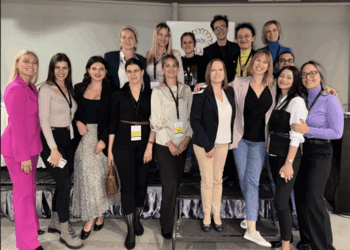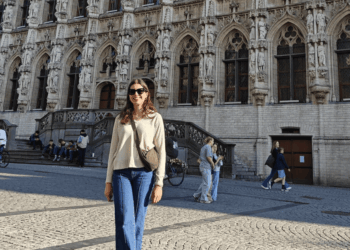Juan A. Marín Jiménez is a PhD student at the Bellvitge Biomedical Research Institute in Spain who received an EACR Travel Fellowship to visit and work at the Ludwig Cancer Research Institute in Switzerland between February and October 2024.
The EACR, with support from Worldwide Cancer Research, provides Travel Fellowships of up to €3,500 to enable early-career cancer researchers to gain new skills through a short-term visit to a lab or research group in another country.
You can read about other Travel Fellows and their experiences here.
 Name: Juan A. Marín Jiménez
Name: Juan A. Marín Jiménez
Job title: PhD student
Home institute: Bellvitge Biomedical Research Institute in Spain
Host institute: Ludwig Cancer Research Institute in Switzerland
Dates of visit: 02 February – 31 October 2024
Other organisations that funded your trip: LaCaixa Foundation
Research: My research focuses on understanding how the immune system behaves during the first phase of treatment for advanced ovarian cancer. While most patients respond well to initial chemotherapy, this treatment can affect the immune cells within the tumour and their ability to react against malignant cells in different ways. By evaluating pre- and post-treatment samples from various patients groups, we aim to improve our understanding of the immune response against ovarian cancer for adapting subsequent treatments to each patient.
Why did you choose to apply for an EACR Travel Fellowship?
I am currently working as a PhD researcher at IDIBELL and, as part of the international PhD programme at the University of Barcelona, we are encouraged to spend at least 3 months abroad. When looking for funding for this stay, I found the EACR Travel Fellowship programme one of the best support opportunities for this type of visits for early-career researchers.
How did you choose the host lab?
Since I entered the tumour microenvironment and ovarian cancer research field, I have been following and feeling inspired by Dangaj’s lab research work. I had the opportunity to meet Dr. Dangaj and her team at the ESMO Immuno-Oncology meeting, where we could discuss our projects and found we have well-aligned questions and that our study populations could complement each other. From that exciting conversation we kept in touch, we had some meetings with my supervisors at IDIBELL (Dr. Alemany and Dr. Piulats) and developed a collaborative plan for a research internship in the Tumour Microenvironment and Biomarker Discovery group, at the Ludwig Cancer Institute.
Was there anything you particularly liked about the host institution?
Yes, among many other things I loved the inspiring environment at the Ludwig Cancer Center. All the research groups and facilities are housed in the Agora building and next to the CHUV hospital. This proximity makes it easier to interact and collaborate but, in my opinion, it was the people working there who made me experience a real feeling of community and collective effort every day. At Dangaj’s lab we were always interacting to each other, having collective meetings with other groups, discussing new ideas and projects; and more important, having a lot of fun while doing it. I enjoyed attending all the first-level scientific seminars and admired the group’s passion for teaching and mentoring the visitors and master’s students.
“I am confident we will generate impactful research and advances on our common goals in improving the ovarian cancer patients care”
Can you summarise the research you did?
During these 9 months at Dangaj’s lab, I could advance and deepen on the study of the immune response and the tumour microenvironment (TME) of ovarian cancer patients treated with neoadjuvant chemotherapy (NACT). Using patient-derived tumour samples from my home institution, I trained on multiplex immunofluorescence to characterise the immune subpopulations, and I learnt how to apply the workflow and algorithms for spatial analysis and phenotyping. Additionally, I learnt how to process and evaluate tumour samples using single-cell RNA sequencing, gaining expertise on computational analysis. Moreover, I could help to develop an in vivo model to replicate the NACT setting, which will help us to validate our observations on the human tissues.
As a medical oncologist, another exciting aspect of my internship was to be involved in the clinics. I took the opportunity to follow Dr. Eleonora Ghisoni, a member of the lab and medical oncologist on the Immuno-Oncology team, to gain experience in advanced immunotherapies clinical management. Overall, this internship provided me with new technical and analytical skills and, more important, a new perspective on how to develop translational research.

Did you have a personal mentor or anyone who particularly helped you?
Denarda Dangaj, she was my supervisor during the internship and an exceptional mentor. From the very first day of my stay, she took care of me and made me feel part of the group. I loved discussing science and the project with her; she always encouraged me ask new questions and push the boundaries of the initial objectives of the project. Her ability to motivate and guide all of us, listening and trusting us individually while maintaining the sense of team and family, is something I will never forget. I am also deeply grateful to every person in the team: Aspram, Flavia, Noemie, Mathieu, Tania, Bovannak, Eleonora, Nicolas, María, David, Fabrizio, and Alizeé. Their support and warmth during these months, everything I learnt from each of them and all the happy moments we shared together made this experience unforgettable.
Did you take part in any interesting local activities during your visit?
Absolutely! It was the first time in the country for me and I had a great time discovering and immersing myself in the Swiss nature and culture. I fell in love with the Leman and spent a lot of time exploring the villages around it, running by the lake and even swimming in its cold waters. The mountains are also stunning, and I had the opportunity to do some trekking, practicing snow sports and other outdoor activities which are an essential part of the Swiss lifestyle. I also loved the cultural life of Lausanne. I was surprised with the vibrant cultural scene of the city and I could enjoy many live music concerts and art exhibitions. Attending the Festival de la Cité in July or visiting the Fondation de l’Hermitage were some of my favourites.
Does your lab plan to do any future collaboration with the host lab?
Definitely! Both labs are super excited about the future of this collaboration. We have already had some meetings to plan the next steps for the project and are exploring new opportunities for collective grant applications. Personally, I feel this has been just the first step of something bigger and I am confident we will generate impactful research and advances on our common goals in improving the ovarian cancer patients care.
Want to find out more?
If you are interested in applying for the Travel Fellowship scheme, please click here for more information: EACR Travel Fellowships.








